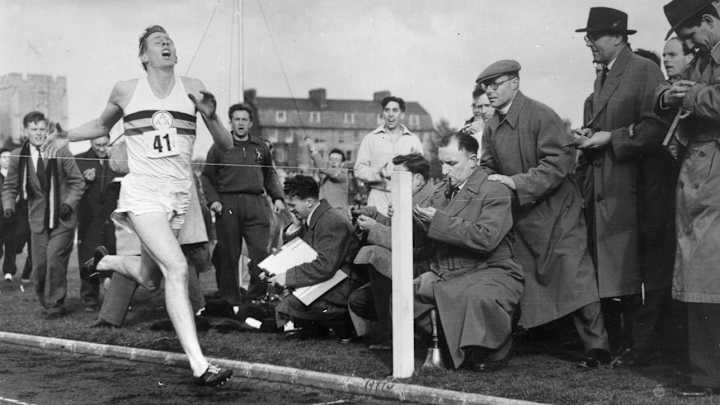By Breaking the Four-Minute Mile, Roger Bannister Showed Limits Only Exist in Our Minds

On Sunday morning, the running community awoke to the news that Sir Roger Bannister, the first man to break the four-minute mile barrier, passed away peacefully at the age of 88 in Oxford, the same city that propelled him to fame nearly 64 years ago when he displayed that limits are just a creation in our minds.
Bannister's legend was born on May 6, 1954, when he took to the Iffley Road cinder track at Oxford despite unfavorable weather conditions and became the first man to run a mile in under four minutes—a feat many deemed impossible and possibly deadly, much like climbing Mt. Everest. Yet the 1953 summit of Everest by Edmund Hillary and coronation of Queen Elizabeth II were two of the events leading up to Bannister’s magical run that revived Great Britain in the aftermath of World War II.
Swedish runner Gundar Haegg’s 4:01.4 had stood as the world record for nine years. American Wes Santee and Australia’s John Landy were starting to creep into the 4:02 range but eyes were set on breaking the four-minute barrier. Their shortcomings came down to weather or training conditions being slightly off on the given day. Having not been affected as much by the war, Landy was considered a favorite to accomplish the feat first and was on his way to Finland to attempt the record-setting run. Bannister, who had set the goal for himself of breaking four minutes after placing fourth at the 1952 Olympics in Helsinki, adjusted his schedule to race in early May before Landy could attempt to pull off the “impossible” feat.
Athletes Pay Tribute to Track and Field Legend Roger Bannister
High winds almost cancelled Bannister’s plans to race after working his shift at a hospital. Bannister was a medical student and due to his busy class schedule, he sometimes had to cram just 30 to 40 minutes of training in a day. Given his limitations, training sometimes consisted of just running hard during lunch breaks and not necessarily fine-tuned workouts.
Once he made up his mind to race, Bannister recruited friends Chris Brasher and Chris Chataway of the Amateur Athletic Association to evenly pace him for the first three quarter-mile laps. The race got off with a 58-second first lap before crossing the halfway point in 1:58.3. The pace lagged in the third lap to 3:01, which meant Bannister was going to have to run faster than 59 seconds for his final lap alone.
“With five yards to go, the finishing line seemed almost to recede,” Bannister wrote in Twin Tracks. “Those last few seconds seemed an eternity. The faint line of the finishing tape stood ahead as a haven of peace after the struggle. The arms of the world were waiting to receive me only if I reached the tape without slackening my speed. If I faltered now, there would be no arms to hold me and the world would seem a cold, forbidding place. I leapt at the tape like a man taking his last desperate spring to save himself from a chasm that threatens to engulf him.”
Magical Mile Was Just One of Sir Roger Bannister's Myriad Accomplishments
Announcer Norris McWhirter slowly announced “In a time which, subject to ratification, is a new track record, British Native record, British all-comers record, European record, Commonwealth record and world record…three minutes…” and that’s all that mattered to the roaring crowd.
Through his own medical expertise, Bannister was able not only able to put together his own training regimen but finally an answer to the exploration of human potential. As he put it, those three minutes and 59.4 seconds freed him “the burden of athletic ambition.”
Today, more than 1,300 athletes have broken four minutes for the mile, including 514 American men. It remains the benchmark of a successful middle distance runner. Fewer people have broken four minutes for the mile than summited Everest.
Bannister was the world record holder for just 46 days before Landy broke the world record at a meet in Finland by running 3:58.0. This ultimately led to the “Miracle Mile” showdown between the two stars at the Commonwealth Games in Vancouver later that August. Despite some early leading by Landy, Bannister’s kick once again prevailed and put him under four minutes in 3:58.8. Bannister’s final race came later that month with a victory in the 1,500 meters at the 1954 European championships. Soon after, he decided to retire at 25 years old with no Olympic medal (a blessing in disguise to the world, as he probably would’ve retired from athletics had he won gold) to focus on medicine.
Sir Roger Bannister, First to Run Sub Four-Minute Mile, Dies at 88
He was named Sports Illustrated’s first Sportsman of the Year in 1954. The magazine made its decision that “the electrifying running of history's first four-minute miler—a man of no fanfare—made him year's pre-eminent man of sport.”
Bannister became a world renowned neurologist after his running career. He was knighted in 1975 for his work in researching the failures of the autonomic nervous system. He also became a major advocate for clean sport by initiating testing for anabolic steroids when serving as the British Sports Council’s chairman from 1971 to 1974. In 1985, he was appointed master of Oxford’s Pembroke College, which he served for eight years. In the later years of his life, Bannister always felt more proud of his accomplishments in medicine than his work on the track.
The first sub-four minute mile remains one of the greatest achievements of the 20th century. It opened the floodgates to something people believes to be physiologically impossible and broke down the walls of what our minds believed could be accomplished. Bannister set the precedent for future generations of British runners that would later hold the mile world record including the likes of Lord Sebastian Coe or Steve Cram.
In 1954, there were a handful of men who possessed the physical speed and self-belief to push the limits of human achievement. Bannister will forever be the first to break the barrier.
